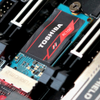Specifications & Features
Specifications & Features
Toshiba is offering three versions of the affordable OCZ RC100 series (120GB/240GB/480GB). For endurance, our tested 240 model has been rated at 120 TBW. The series as stated will be fitted with TLC written 3D NAND flash memory (vertically stacked). This allows Toshiba to offer the proper storage volumes, the RC100 are DRAM' less, so there is no added DRAM cache chip.
No DRAM but HMB? Windows 10 Fall Creators Update (2017) then is mandatory
There's a new trick (and it works well), combined with the Windows 10 Fall Creators Update (2017) or later you are compatible with a new technology called Host Memory Buffer. Very simply put, you reserve a chunk of your system memory which substitutes the memory of the drive to cache the map table. Thus not using DRAM SSD caches equals a nice price reduction as the cost of an added DRAM chip (or two) is taken away from the bill of materials used. Nothing is free though - A 480 GB SSD would utilize 480 MB of your system memory and if a 1 TB SSD would be available, you'd be looking at 1GB of Host Memory Buffer (which also is the maximum the controller can utilize). at 10 euros/USD per GB for DDR4 memory, that is memory has been eaten away by your SSD. Ergo, you zare still paying a price for a DRAM cache, however, it's shifted towards your system memory.
Controller with Host Memory Buffer and NAND
NAND then, your storage memory chips. So instead of using Planar NAND, 3D NAND is used. 3D TLC NAND is physical vertical NAND cell stacking not to be confused with chip stacking in a multi-chip package. In 3D NAND, NAND layers, not chips, are stacked in a single IC. The good news is continued cost reduction, smaller die sizes and more capacity per NAND chip. Also, installed NAND toolsets in the wafer fabs can, for the most part, be reused, thereby extending the useful life of fab equipment. The NAND ICs are driven by an in-house controller that resided in that NAND package, again there is No DRAM cache here to be found, but some provisioning, with the help of a smaller SLC written cache. Numbers are binary, and in the world of hardware always based don multiples of 8 bits. This means out tested 240GB model really has 256GB of NAND. 256-240= 16GB used for an SLC cache (provisioning).
The RC100 Series utilizes a cost-effective, high-performance PCIe-to NAND controller to manage a full PCIe Gen 3(8Gb/s) x 2 bandwidth (that's not a typo btw, to cut cost, this unit is using PCIe 3.0 x2 over the NVME 1.2 protocol) with the host while managing multiple NAND flash memory devices on 4 channels. The controller is embedded into the NAND package and Toshiba isn't giving any information on it. The only partner in the business having such a controller, however, is Silicon motion with their SM2263XT.. Combined with the Windows 10 Fall Creators Update or later you are compatible with Host Memory Buffer technology, your system memory substitutes the memory of the drive to cache the map table.
Pricing
Toshiba is able to keep the prices low but we're fast with this review, and online the SSD is still hard to find. Toshiba Memory Corporation was able to fit an entire SSD within a single BGA package. The RC100 Series balances cost and performance and bridges the gap between SATA and enthusiast-grade NVMe SSDs. A compact design also enables the RC100 to fit onto an M.2 2242 (22x42mm) PCB, making it one of the smallest SSDs commercially available.
|
Toshiba OZC RC100 series |
|||
| Performance | 120GB | 240GB | 480GB |
| Form factor | M2 Type 2242-S3-BM | ||
| Interface | 16GT/s PCIe 3.0 x2 | ||
| Nand | Toshiba BiCS TLC-nand, 64 layers | ||
| Sequential reading speed | 1350MB / s | 1600MB / s | 1600MB / s |
| Sequential writing speed | 700MB / s | 1050MB / s | 1100MB / s |
| Read random 4K IOPS | 80.000 | 130.000 | 150.000 |
| Write random 4k IOPS | 95.000 | 110.000 | 110.000 |
| Endurance in TBW | 60 | 120 | 240 |
- RC100-M22242-120G £ 45,63 / 49 EUR / 54 USD
- RC100-M22242-240G £ 64,99 / 69 EUR / 74 USD
- RC100-M22242-480G £ 122,50 / 129 EUR / 134 USD
So for the 240 GB model you are looking at just under 30 cents per GB depending on your monetary value. Also, that's an MSRP, street prices will be lower in a while, as they always do.


![toshiba_ocz_rc100_front.lo[62516].png](https://www.guru3d.com/data/publish/220/78bee38a267a03e23b0dc8dbae007009038206/toshiba_ocz_rc100_front.lo%5B62516%5D.png)
